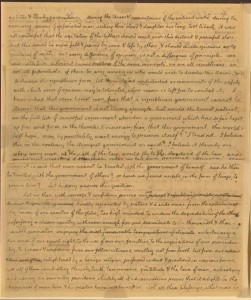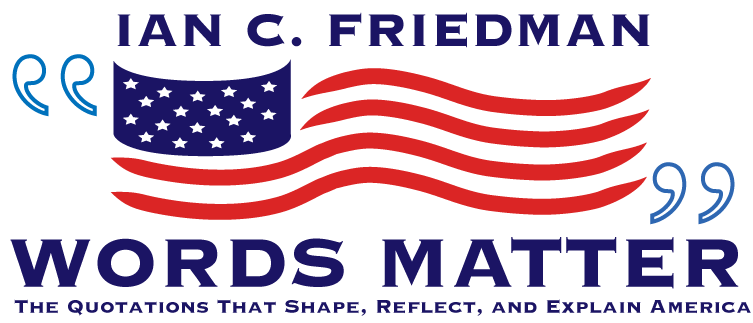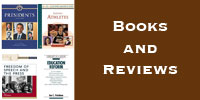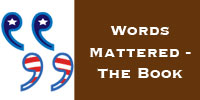“We are all Republicans, we are all Federalists.” – Thomas Jefferson, March 4, 1801
 Two hundred nine years ago today, Thomas Jefferson finally emerged victorious in the presidential election of 1800. That contest, and the 1796 election that also pitted Federalist John Adams against Democratic-Republican Jefferson, were closely and bitterly fought. They were also steeped in partisan rancor, a theme of political life that is especially prominent today.
Two hundred nine years ago today, Thomas Jefferson finally emerged victorious in the presidential election of 1800. That contest, and the 1796 election that also pitted Federalist John Adams against Democratic-Republican Jefferson, were closely and bitterly fought. They were also steeped in partisan rancor, a theme of political life that is especially prominent today.
Jefferson walloped Adams in the popular vote by over 20 percentage points in 1800. However, back then, presidential electors were required to vote for two people for president, with the person receiving the highest number of electoral votes becoming president and the person with the second highest total gaining the vice presidency. Yet even though Jefferson had won decisively in the popular vote, the electoral vote resulted in a tie between him fellow Republican Aaron Burr, who had been slated for the vice-presidency.
Based on the Constitution, the responsibility for choosing the president then went to the House of Representatives. Each of the 16 states in the Union had one vote, which required the eventual winner to gain nine votes. The lame-duck House was controlled by the Federalists, who generally distrusted Burr but detested Jefferson. The House remained a hung jury after almost a week and 35 ballots. Helping broker a resolution was former Secretary of the Treasury and prominent Federalist Alexander Hamilton. His support of Jefferson was not motivated by affection or deep respect for him. Rather, it was fueled by his contempt for Burr. Historian Joanne Freeman notes that Hamilton’s influential preference for Jefferson over Burr was rooted in his view that Jefferson at least cared about what others might think about him, which would temper his behavior in office. Burr, according to Hamilton, was less predictable, more impulsive and self-centered, and ultimately had “nothing in his favor.”
The entire episode has since been referred to as “The Revolution of 1800” and “A Magnificent Catastrophe” The campaign’s and election’s intensity–exacerbated by the absence of the unifying figure of George Washington, who died a year earlier–has led many to consider it the first modern presidential election. It helped solidify the two-party system still dominant in American politics and, perhaps most importantly, it represented the first peaceful transfer of power between different political parties and set a precedent that has been followed and admired ever since. Other direct outcomes from the election of 1800 are the passage of the 12th Amendment in 1804 that required electors to vote separately for president and vice president and the escalation of personal animus between Burr and Hamilton, which led to the latter’s death in a duel, also in 1804.
During Jefferson’s first inaugural address, delivered less than three weeks after he was finally chosen to be president (and pictured in Jefferson’s handwriting below), the new president sought to mend the partisan wounds of the previous weeks and the recent years. Jefferson framed this appeal in a grand sense of unity and a spirit of Americanism still in relative infancy. At its foundation was a stirring appeal to the young nation’s radical belief in self-government and the strong and sensible claim that what was shared among its citizens was far too valuable to be destroyed by what divided them.
 But every difference of opinion is not a difference of principle. We have called by different names brethren of the same principle. We are all Republicans, we are all Federalists. If there be any among us who would wish to dissolve this Union or to change its republican form, let them stand undisturbed as monuments of the safety with which error of opinion may be tolerated where reason is left free to combat it. I know, indeed, that some honest men fear that a republican government can not be strong, that this Government is not strong enough; but would the honest patriot, in the full tide of successful experiment, abandon a government which has so far kept us free and firm on the theoretic and visionary fear that this Government, the world’s best hope, may by possibility want energy to preserve itself? I trust not. I believe this, on the contrary, the strongest Government on earth. I believe it the only one where every man, at the call of the law, would fly to the standard of the law, and would meet invasions of the public order as his own personal concern. Sometimes it is said that man can not be trusted with the government of himself. Can he, then, be trusted with the government of others? Or have we found angels in the forms of kings to govern him? Let history answer this question.
But every difference of opinion is not a difference of principle. We have called by different names brethren of the same principle. We are all Republicans, we are all Federalists. If there be any among us who would wish to dissolve this Union or to change its republican form, let them stand undisturbed as monuments of the safety with which error of opinion may be tolerated where reason is left free to combat it. I know, indeed, that some honest men fear that a republican government can not be strong, that this Government is not strong enough; but would the honest patriot, in the full tide of successful experiment, abandon a government which has so far kept us free and firm on the theoretic and visionary fear that this Government, the world’s best hope, may by possibility want energy to preserve itself? I trust not. I believe this, on the contrary, the strongest Government on earth. I believe it the only one where every man, at the call of the law, would fly to the standard of the law, and would meet invasions of the public order as his own personal concern. Sometimes it is said that man can not be trusted with the government of himself. Can he, then, be trusted with the government of others? Or have we found angels in the forms of kings to govern him? Let history answer this question.




